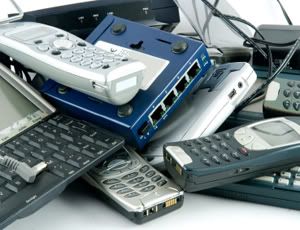Most people love getting new gadgets for the holidays, whether they are tech-savvy professionals or folks who never figured out how to program their VCRs or set up a MySpace page. This year there are more possibilities than ever to find under the tree, from the revolutionary, highly accessible Wii Nintendo console to sophisticated cell phones that are connecting people in new ways. Even underprivileged children around the world are now receiving discount laptops in record numbers, hopefully helping to breach the digital divide.
But the burgeoning market of electronics and accelerating pace of technology have meant increased environmental impact. This is perhaps never more true than after the holidays, when people clean out their old gear in favor of the new shiny toys and appliances they have just received, or purchased through gifts, bonuses or seasonal sales. With the 2009 change in TV transmissions around the corner, even more e-waste is being generated. Plus, consider that the average cell phone user changes handsets every 18 months.
The good news is awareness of the potential ecological impact is also rising, and there are ways to make a difference, especially at the end of your product's life.
It's no small step, considering that 20 to 50 million tons of electronics waste (often called e-waste) is discarded globally every year, according to Greenpeace. If all that e-rubbish were put into containers on a train it would go once around the world! E-waste is the fastest growing component of the municipal solid waste stream, and currently makes up five percent of all municipal solid waste.
In the past, no one thought of recycling computers and other electronics. The only option was tossing them on the curb. But these days engineers have taken notice that electronics usually contain a wealth of valuable materials. Plus, recycling almost always means lower net carbon emissions, which is something everyone is now paying closer attention to because of global warming. Finally, electronics are made with a sizable amount of lead, cadmium, brominated fire retardants and plastics that can leach toxic breakdown products — that's stuff no one wants in their water supply!
The Consumer Electronics Association, which represents electronics manufacturers, encourages people to recycle their e-waste, and has set up a handy Website to make the process simple. Log on to mygreenelectronics.org, where you can search for local recycling drop-off points by zip code and product category. You'll also find tips and info on electronics recycling, and a cool energy calculator that will show you how much juice each product uses

Subscribe to:
Post Comments (Atom)
(c) Gorgeous and Green
WP theme by | Courtesy of Piercing, Converted to BLOGGER by BloggerThemes.Net




2 comments:
I had no idea honestly that we could recycle all these tech things. I knew about the cell phone batteries but not the rest. Thanks for letting me know. :)
I have heard about this being a problem. I am glad to hear that there is some action being taken to rectify this growing problem! Technology gets outdated so quickly that it is important that we find a way to recycle the old products!
Post a Comment